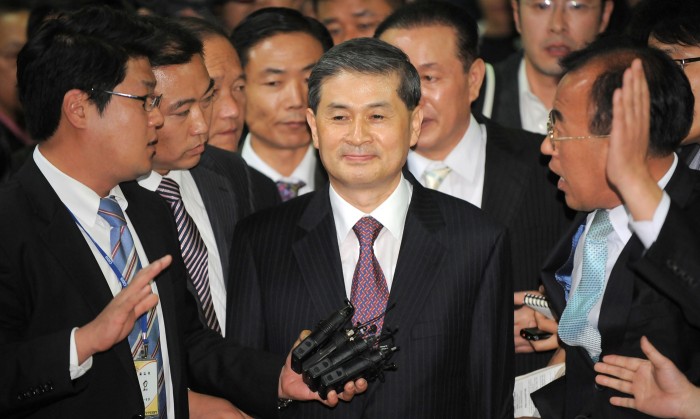Science Magazine Prize Has Ties to Researcher Who Disgraced Its Pages
A top American scientific journal is reconsidering financial ties to a Chinese cloning company called Boyalife because of that company’s connections to a known fraudster.
The journal, Science, said it would investigate the sponsorship of a joint academic prize awarded this week after MIT Technology Review pointed out links between Boyalife and Hwang Woo-Suk, a Korean scientist who embroiled the journal in a gigantic misconduct scandal a decade ago.
Little known outside China, Boyalife Group started making news in November with claims that it would build the world’s largest animal cloning center in coöperation with Sooam Biotech Research Foundation, a Seoul company started by Hwang after he was drummed out of academia.
Boyalife’s CEO, Xu Xiaochun, said the company planned to produce as many as one million cloned cattle embryos a year, as well as dogs and racehorses. He also stirred debate for comments in which he said the company was technically capable of cloning humans, should society accept it. The American Association for the Advancement of Science (AAAS), the publisher of Science, has previously endorsed a “legally enforceable ban” on human reproductive cloning.

Last year, Science and Boyalife agreed to jointly sponsor an annual $25,000 prize for outstanding research in stem cells and regenerative medicine by young investigators.
That arrangement generates revenues for Science because Boyalife not only puts up the purse but is required to purchase advertisements in the pages of AAAS journals. A spokesperson for Science, Meagan Phelan, declined to say how much revenue the deal had generated, but a full-page ad in the weekly lists for $8,560.
In a statement from the AAAS released by Phelan, the organization said it was looking into Boyalife’s connection to Hwang. “We further are having internal discussions now concerning the sponsorship of this nonprofit award program. This internal process has just begun,” the statement said.
A spokesperson for Boyalife said Xu was too busy to comment, but would attend a prize ceremony in San Francisco on June 23. Hwang did not reply to an e-mail.
For Boyalife, the prize collaboration with Science has been a way to burnish its credentials with a global audience. But the commercial tie-up is problematic for the journal because of how Boyalife has also simultaneously praised Hwang, who was convicted in Korea of bioethics violations and embezzlement and given a two-year suspended jail sentence.

For instance, of the 25 tweets emitted by the company’s Twitter account as of yesterday, most either highlight its connection to Science or praise Hwang’s cloning achievements, such as creating copies of Tibetan Mastiff dogs. “Congratulations! Hwang Woo-suk is a great scientist,” the account tweeted on April 18, in between messages advertising Boyalife’s interactions with Science’s publisher, Rush Holt.
That tweet was deleted last night after MIT Technology Review brought it to the attention of Science.
In fact, Hwang caused one of the worst scandals ever to ensnare the publication. Starting in 2004, Hwang published two papers in Science claiming he’d successfully cloned human embryos and derived stem cells from them. The technology was viewed as a way to create cells exactly matching a particular patient, and the AAAS lobbied strongly against U.S. restrictions on the work, then considered controversial.
However, it later became clear that some of the human eggs used in the cloning were provided by Hwang’s own students, a massive ethics breach, since junior female scientists could have been pressured into a medical procedure. The scientific results themselves were later found to have been based on fabricated data, and in 2006 Science ordered an immediate and unconditional retraction of both papers.
Citing “serious research misconduct,” the journal said it would review its procedures to better detect cases of “well-constructed fraud.” Hwang was subsequently fired by Seoul National University. “Fraudulent research is a particularly disturbing event, because it threatens an enterprise built on trust,” said Donald Kennedy, who was then Science’s editor-in-chief.
Since his dismissal from academia, Hwang, once crowned the “King of cloning” by the Korean press, has staged something of a comeback. He started a biotech company, Sooam, that offers to create copies of dead dogs for $100,000 each, and resumed publishing scientific papers. His collaboration with the Chinese to create the world’s biggest cloning factory seemed certain to help him regain his title.
Little can be gleaned about Boyalife’s business from its website. The company operates a stem cell bank and says it has more than 30 subsidiaries involved in genomics and pharmaceutical research. In the brief biography that it attaches to press releases, it highlights a 2012 Chinese television brand award and its involvement with the Science prize as among its most important credentials.
Keep Reading
Most Popular
Large language models can do jaw-dropping things. But nobody knows exactly why.
And that's a problem. Figuring it out is one of the biggest scientific puzzles of our time and a crucial step towards controlling more powerful future models.
The problem with plug-in hybrids? Their drivers.
Plug-in hybrids are often sold as a transition to EVs, but new data from Europe shows we’re still underestimating the emissions they produce.
Google DeepMind’s new generative model makes Super Mario–like games from scratch
Genie learns how to control games by watching hours and hours of video. It could help train next-gen robots too.
How scientists traced a mysterious covid case back to six toilets
When wastewater surveillance turns into a hunt for a single infected individual, the ethics get tricky.
Stay connected
Get the latest updates from
MIT Technology Review
Discover special offers, top stories, upcoming events, and more.